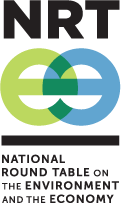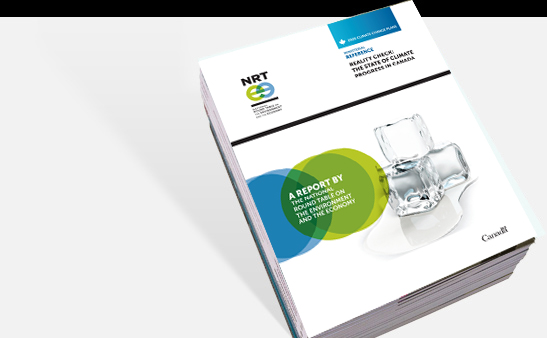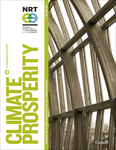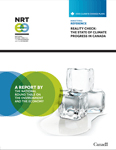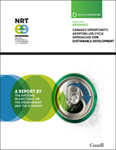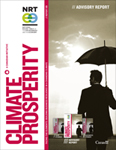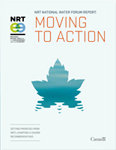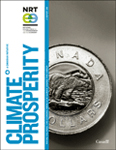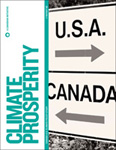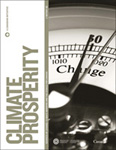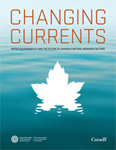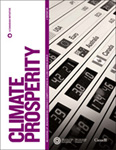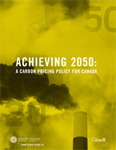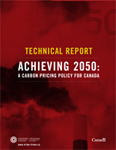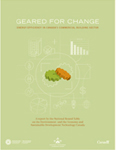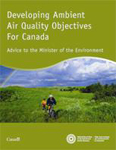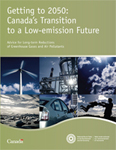Annual Report 2007-2008 – A Look Ahead
Carbon Emission Pricing Policies
The NRTEE’s Getting to 2050: Canada’s Transition to a Low-Emission Future report concluded that a suite of different emission price policy packages could deliver significant GHG emissions reductions over the long-term; however it was observed that the effectiveness of each policy is a question of design and implementation, and that policy design matters to address the issue of environmental effectiveness and economic competitiveness.
As a result, the NRTEE is now embarking on research that will further examine the potential implications of GHG emission reduction policies for Canada, looking at both the environmental and economics effects. Once again, the focus of the NRTEE policy research is on the medium (2020) and long-term (2050). The objectives of this project are to provide policy advice on the important elements of carbon emission pricing that will need to be settled upon; and, to recommend a long-term carbon emission policy package – of which the core is a tax, a cap-and-trade system, or a hybrid of the two – that can guide future climate policy design in Canada. The focus of the research will be on the design elements of a policy package, however due consideration will be given to related issues including:
- the need for wide-spread low-emission technology dissemination;
- potential competiveness implications;
- sectoral and regional effects; and
- federal-provincial governance.
An expert advisory committee is engaged in this research to guide our work and to ensure that the NRTEE’s research is informed by a diverse range of perspectives from across the country.
This report is expected to be released in the current fiscal year.
GHG Emissions Forecasting: Learning from International Best Practices
Successful climate policies are those that achieve forecasted greenhouse gas (GHG) emissions reductions. But, forecasting GHG emissions reductions from specific policies and measures is difficult and challenging, as we noted in our 2007 Response to Our Obligations Under the Kyoto Protocol Implementation Act. This new project responds directly to a key recommendation by the NRTEE in its 2007 response, that the federal government look at international best practices in the forecasting of emissions reductions resulting from government policies.
The research will look at the issue from both a methodological and a governance perspective. It will incorporate domestic and international GHG forecasting practices, with the objective of identifying best practices that can be applied to the Canadian policy context. Specifically, this research will examine a number of key concerns related to GHG emission forecasting including:
- forecasting methods used to describe the emissions reductions accruing from a particular initiative;
- issues of additionality, free ridership, rebound effect and policy interaction effects;
- the importance of transparency and clarity with respect to key assumptions and methods;
- the consideration of important sensitivities and uncertainties;
- the importance of consistency in approaches; and
- the need to integrate the findings in a holistic framework.
This report will be released in tandem with our 2008 Response to our obligations under the KPIA.
Response of the National Round Table on the Environment and the Economy to its Obligations Under the Kyoto Protocol Implementation Act (2008)
To meet its obligations under the Kyoto Protocol Implementation Act, the NRTEE will review the Government of Canada’s 2008 Climate Change Plan (for purposes under the Kyoto Protocol Implementation Act). The NRTEE report will be provided to the government at the end of July 2008 and released shortly thereafter.
Energy Efficiency in the Commercial Buildings Sector
In its 2006 Advice on a Long-Term Strategy on Energy and Climate Change, the NRTEE identified energy efficiency in buildings as a strategic priority for reaching Canada’s long-term GHG emission reduction targets (60% below 2006 levels by 2050). While technologies to help reduce commercial building energy use and emissions exist, enabling policies are needed to ensure their deployment and implementation across the Canadian regions and industry.
Acknowledging this, the NRTEE recently partnered with Sustainable Development Technology Canada (SDTC) to develop the policy action framework needed to stimulate emission reductions and increase energy efficiency within the commercial building sector.
Specifically, this NRTEE project will:
- Outline the current context for energy use and carbon emissions in commercial buildings across Canada – including the market profile, an evaluation of current and planned policies, market barriers and international best practices; and,
- Design a detailed framework for federal policy action based on energy modeling to promote energy efficiency within the commercial building sector and provide incentives to encourage the use of existing efficient technologies between now and 2050.
An expert advisory committee is engaged to guide research and to ensure that diverse perspectives are represented from across the country and the industry.
This report will be released in fall 2008.
Water Management in Canada
There have been repeated calls to broaden and strengthen the use of market-based instruments in order to protect and conserve Canada’s water resources. Pricing water to reflect its full financial and environmental opportunity costs is seen as a possible means to signal that water is a valuable commodity and that conservation is important.
In 2008 the NRTEE will scope out a new program on the water management issue, with the intent of the full implementation of research beginning in 2009.
Economics of Climate Change in Canada
In October 2006 the United Kingdom government released the Stern Review on the Economics of Climate Change, which examined among other things, the cost implications of GHG emissions. The report concluded that the cost of action to stabilize the climate would be approximately 1% of global GDP, whereas the cost of inaction would be much higher and could range between 5 and 20%. The report received attention worldwide and it is recognized as the most widely known and discussed review of its kind to date. It also generated a great deal of discussion over appropriate methodologies for calculating the “social cost” of carbon emissions.
The Stern report served its purpose in bringing to light the importance of climate change issues in economic terms, but further research is required to illustrate the costs of adaptation and country-specific issues. The report was not able to delve into specific national conditions and circumstances, and so is of limited utility to policy-makers in developing a national policy response to climate change.
In 2008 the NRTEE will scope out a research program that will carry out such an assessment for Canada. The expectation is that this research will yield important findings, insights, and recommendations that will be of direct relevance to governments across the country. The research issue is a question of what a climate adjusted economy would look like, the benefits and costs of adaptation, and the integration of mitigation and adaptation strategies. The program will reveal the severity of costs entailed to adapt to climate change impacts in the longer term, as well as the potential benefits to integrating climate change mitigation and adaptation strategies. The focus of this program will be to analyze the macro-economic costs and benefits of addressing climate change impacts, through both mitigation and adaptation policies and actions.
